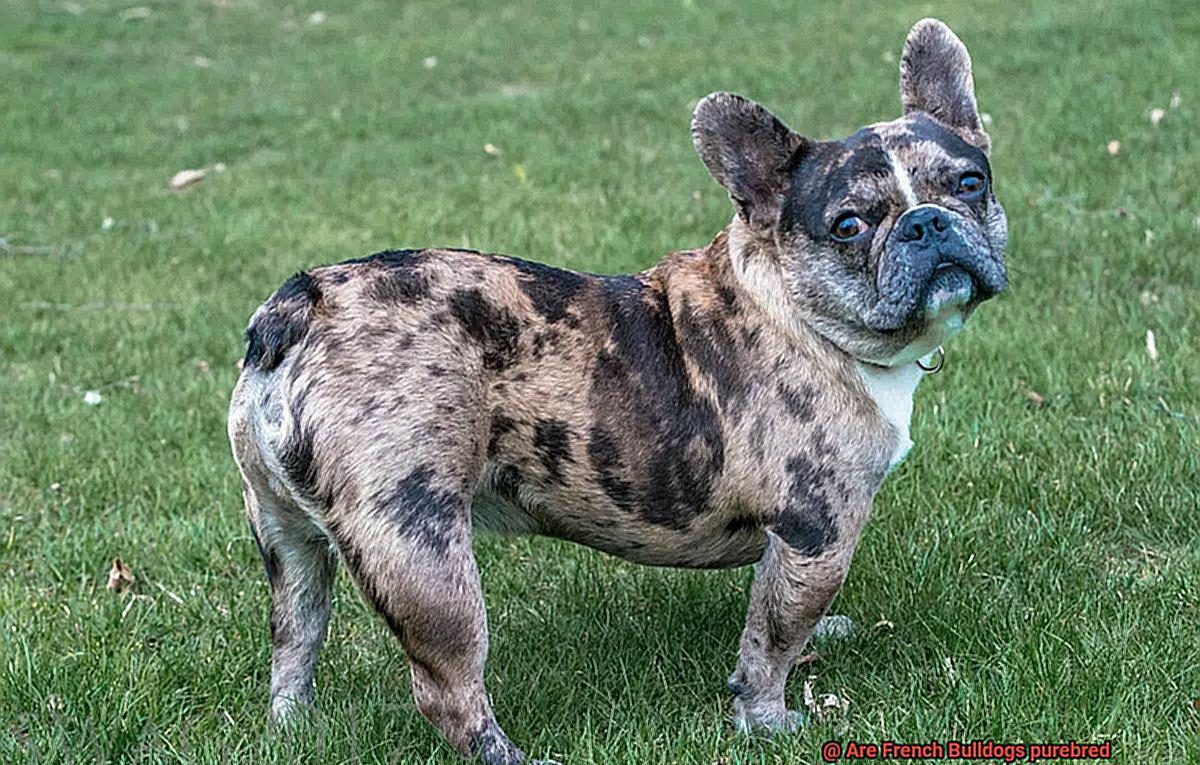Are French Bulldogs purebred?
Welcome to the enchanting realm of French Bulldogs. Whether you’re thinking about bringing one of these squishy-faced cuties into your life or simply have a burning curiosity about them, you’ve come to the perfect spot. French Bulldogs have skyrocketed in popularity, captivating hearts all over the globe with their one-of-a-kind looks, affectionate nature, and unwavering loyalty.
These little bundles of joy trace their roots back to a mix of English Bulldogs, Terriers, and local French ratters, creating a fascinating lineage. Bred in 19th century France, these pint-sized pooches quickly became beloved by lace workers and artisans. Originally used as rat hunters, they soon won over the hearts of the French society with their irresistible charm and compact size.
French Bulldogs are renowned for their unique bat-like ears, wrinkled faces, and sturdy builds. Despite their small stature, they possess personalities that could fill a room. Playful and friendly to the core, they effortlessly win over everyone they meet. However, it’s worth noting that these little guys need regular exercise and mental stimulation to keep them happy and healthy.
In this blog post, we’ll take a deep dive into the world of French Bulldogs. We’ll explore their distinctive traits, debunk common misconceptions surrounding them, and even touch on the question of their purity. So grab yourself a cup of joe, settle in comfortably, and prepare to be utterly captivated by the undeniable allure of the French Bulldog.
Are French Bulldogs Recognized as a Purebred Breed by the AKC?
Contents
- 1 Are French Bulldogs Recognized as a Purebred Breed by the AKC?
- 2 How to Identify Reputable Breeders of French Bulldogs?
- 3 The Advantages of Buying a Purebred French Bulldog
- 4 What to Look Out for When Purchasing a French Bulldog?
- 5 The Benefits of DNA Testing for Confirming the Purity of a French Bulldog’s Lineage
- 6 How to Research and Educate Yourself about the Breed Before Acquiring a French Bulldog?
- 7 Common Myths and Misconceptions About French Bulldogs
- 8 What Makes French Bulldogs Such Popular Pets?
- 9 Conclusion
French Bulldogs, with their distinctive appearance and friendly temperament, have become one of the most beloved dog breeds around the world. But are they recognized as a purebred breed by the American Kennel Club (AKC)? The answer is a resounding yes. Let’s dive into why French Bulldogs have earned this prestigious recognition.
The AKC, known for its strict standards and guidelines, officially recognized the French Bulldog breed in 1898, making it one of the oldest recognized breeds by the organization. To be recognized by the AKC, a breed must have a sufficient number of dogs registered with the organization. French Bulldogs easily meet this requirement, as their popularity has soared in recent years.
In addition to numbers, the AKC also requires that a breed have a dedicated breed club or association working towards preserving and promoting that particular breed. The French Bulldog Club of America fulfills this requirement for French Bulldogs. This club plays a crucial role in maintaining the breed’s standard and ensuring responsible breeding practices.
Speaking of standards, the AKC has established a detailed breed standard for French Bulldogs that outlines their ideal characteristics, appearance, and temperament. This serves as a guide for breeders and judges when evaluating French Bulldogs in dog shows and other AKC-sanctioned events.
But being recognized as a purebred breed is not just about paperwork and standards; it also involves responsible breeding practices and health testing requirements. Breeders who wish to register their French Bulldogs with the AKC must adhere to specific breeding practices and meet certain health testing requirements. This ensures that French Bulldogs with AKC registration come from responsible breeders who prioritize the health and well-being of their dogs.
The recognition of French Bulldogs as a purebred breed by the AKC carries numerous benefits. Firstly, it provides potential buyers with assurance that they are acquiring a purebred dog with documented lineage. This is especially important for those who wish to participate in dog shows or competitions, as AKC recognition allows French Bulldogs to compete in AKC-sanctioned events.
Furthermore, the AKC recognition adds value to French Bulldogs as it represents a stamp of authenticity and quality. It distinguishes them from mixed-breed dogs or those without proper documentation. For owners who take pride in their French Bulldogs’ lineage and want to ensure they are part of a breed with a long history and well-established standards, the AKC recognition is a significant factor.

However, it’s important to note that not all French Bulldogs are purebred. Unscrupulous breeders or accidental breeding can result in mixed ancestry. Therefore, it is crucial for potential owners to do their research and obtain their French Bulldogs from reputable breeders who can provide documentation and have a good reputation within the dog breeding community. DNA testing can also be used to confirm the purity of a French Bulldog’s lineage if necessary.
How to Identify Reputable Breeders of French Bulldogs?
French Bulldogs are a popular breed of dog known for their distinctive appearance and friendly temperament. But are they truly purebred? To determine if a French Bulldog is purebred, it is important to understand what “purebred” means in the context of dog breeding.
A purebred dog is one that has a documented lineage and comes from parents of the same breed. In the case of French Bulldogs, the American Kennel Club (AKC) is the primary authority on purebred dog registration in the United States. French Bulldogs are recognized as a purebred breed by the AKC, which means they have a documented lineage and meet the breed standard.
However, it is important to note that not all French Bulldogs are purebred. There are instances of mixed breeding or unethical practices in dog breeding that can result in French Bulldogs with mixed ancestry. Therefore, it is crucial to obtain a French Bulldog from a reputable breeder who can provide documentation proving the dog’s purebred status.
Reputable breeders registered with the AKC can provide documentation that proves the purebred status of their French Bulldogs. They have a transparent record of their breeding dogs’ lineage, including pedigree information and health records. They prioritize the health and well-being of their dogs, conducting thorough health screenings and genetic testing to ensure that their breeding dogs are free from hereditary diseases or conditions.
In addition to documentation, DNA testing can also be used to confirm the purity of a French Bulldog’s lineage by analyzing its genetic makeup. This can provide further reassurance for potential owners who want to ensure they are getting a purebred French Bulldog.
The Advantages of Buying a Purebred French Bulldog
Look no further than the adorable and lovable purebred French Bulldog. Known for their distinct appearance and friendly nature, these little companions offer a variety of advantages that make them a paw-some choice for dog lovers. In this article, we will explore the top advantages of buying a purebred French Bulldog, based on my expertise and first-hand knowledge as a dog enthusiast.
Predictable Traits and Characteristics:
When you choose to bring home a purebred French Bulldog, you can expect predictable traits and characteristics. From their bat-like ears to their compact size, purebred Frenchies possess unique traits that are consistent throughout the breed. This predictability makes it easier for owners to understand and manage their needs, ensuring a harmonious relationship between pet and family.
Health Assurance:
Purebred French Bulldogs from reputable breeders often come with health assurances. These breeders prioritize the well-being of their dogs by conducting thorough health tests to ensure they are free from inherited diseases and genetic disorders commonly found in the breed. By purchasing a purebred Frenchie from a responsible breeder, you can rest easy knowing that your new companion is less likely to develop certain health issues that may be prevalent in mixed breeds or poorly-bred dogs.
Easier Training:
A major advantage of owning a purebred French Bulldog is their potential for easier training. Purebred dogs are intentionally bred for specific traits and characteristics, including trainability. With their intelligence and willingness to please, purebred French Bulldogs are quick learners and respond well to positive reinforcement training methods. This means less frustration for you as an owner and a better-behaved companion overall.
Show or Competition Potential:
If you have dreams of showcasing your pup’s beauty and abilities in dog shows or competitions, owning a purebred French Bulldog can give you a leg up. Purebred dogs meet specific breed standards set by kennel clubs and organizations that govern these events. The conformation, size, and physical attributes of purebred French Bulldogs are carefully evaluated, increasing your chances of success in the show ring.
Community and Support:
When you bring home a purebred French Bulldog, you become part of a wonderful community of passionate and knowledgeable breed enthusiasts. This community can provide you with invaluable support, advice, and resources related to the breed. Whether it’s connecting with other owners online, joining breed-specific clubs or forums, or participating in events dedicated to French Bulldogs, you’ll find yourself surrounded by like-minded individuals who share your love for this special breed.
What to Look Out for When Purchasing a French Bulldog?
French Bulldogs are a popular breed of dog known for their distinctive appearance and friendly temperament. But are they purebred? To determine if a French Bulldog is purebred, it is important to understand what “purebred” means in the context of dog breeding.
A purebred dog is one that has a documented lineage and comes from parents of the same breed. The American Kennel Club (AKC) is the primary authority on purebred dog registration in the United States, and French Bulldogs are recognized as a purebred breed by the AKC. This means that they have a documented lineage and meet the breed standard.
However, it is important to note that not all French Bulldogs are purebred. There are instances of mixed breeding or unethical practices in dog breeding. Some French Bulldogs may have mixed ancestry or come from breeders who do not follow proper breeding practices.
To ensure that a French Bulldog is purebred, it is recommended to obtain the dog from a reputable breeder who can provide documentation and has a good reputation within the dog breeding community. Registered breeders with the AKC can provide documentation that proves the purebred status of their French Bulldogs.
Additionally, DNA testing can also be used to confirm the purity of a French Bulldog’s lineage by analyzing its genetic makeup. This can be particularly helpful if there are any doubts about the dog’s ancestry.
The Benefits of DNA Testing for Confirming the Purity of a French Bulldog’s Lineage
French Bulldogs, with their adorable squished faces and playful personalities, have become one of the most popular dog breeds in recent years. But how can you be certain that your furry friend is a purebred French Bulldog? In this blog post, we will explore the benefits of DNA testing for confirming the purity of a French Bulldog’s lineage.
- Dispelling Doubts: DNA testing provides concrete evidence of a dog’s genetic composition, ensuring that your French Bulldog comes from a purebred lineage and has not been crossbred with other breeds. This is particularly important for breeders who want to maintain the integrity and standard of the French Bulldog breed.
- Health Matters: DNA testing can help identify potential health issues or genetic disorders that may be present in a French Bulldog’s lineage. By analyzing the dog’s DNA, veterinarians and geneticists can detect specific mutations or markers associated with conditions such as brachycephalic syndrome or hip dysplasia. This information allows breeders to make informed decisions about breeding pairs and helps owners take preventive measures to ensure their dog’s well-being.
- Genetic Diversity: Inbreeding and limited genetic diversity can lead to an increased risk of health problems and reduced overall vitality in a breed. DNA testing can provide valuable insights into the genetic makeup of a dog’s lineage, allowing breeders to make informed decisions about outcrossing or introducing new bloodlines to maintain a healthy population.
- Settling Disputes: In cases where there are conflicting claims about a dog’s parentage or heritage, DNA testing can provide an objective and conclusive answer. This can be especially important for breeders participating in dog shows or competitions where accurate lineage documentation is required.
- Accessibility and Affordability: DNA testing has become more accessible and affordable in recent years. There are numerous DNA testing companies that specialize in canine genetics and offer comprehensive testing services. These tests generally involve collecting a sample of the dog’s saliva or cheek cells and sending it to the laboratory for analysis.
How to Research and Educate Yourself about the Breed Before Acquiring a French Bulldog?
French Bulldogs are a popular breed of dog known for their distinctive appearance and friendly temperament. But are all French Bulldogs considered purebred? Let’s dive into this topic to better understand what it means for a dog to be purebred.
To determine if French Bulldogs are purebred, it is important to understand what “purebred” means in the context of dog breeding. A purebred dog is one that has a documented lineage and comes from parents of the same breed. The American Kennel Club (AKC) is the primary authority on purebred dog registration in the United States. French Bulldogs are recognized as a purebred breed by the AKC, which means they have a documented lineage and meet the breed standard.
Breeders who are registered with the AKC can provide documentation that proves the purebred status of their French Bulldogs. This documentation includes pedigrees that trace the lineage of the dog back several generations. It ensures that the dog has a consistent appearance and temperament that aligns with the breed standard.
However, it is important to note that not all French Bulldogs are purebred, as there are instances of mixed breeding or unethical practices in dog breeding. Some French Bulldogs may have mixed ancestry or come from breeders who do not follow proper breeding practices. It is essential for potential owners to research and educate themselves about the breed, its characteristics, and how to identify reputable breeders before acquiring a French Bulldog.
In some cases, DNA testing can also be used to confirm the purity of a French Bulldog’s lineage by analyzing its genetic makeup. This can provide additional reassurance for those who want to ensure they are getting a purebred dog.
Common Myths and Misconceptions About French Bulldogs
French Bulldogs, with their adorable looks and friendly nature, are a sought-after breed. But like any popular breed, there are common myths and misconceptions that surround French Bulldogs. In this post, we will debunk these myths and provide you with accurate information about these lovable dogs.
Myth 1: French Bulldogs are purebred descendants of ancient bulldogs.
Contrary to popular belief, French Bulldogs are not direct descendants of the bulldogs of ancient Greece. While they do have some ancestral ties to those bulldogs, the breed was actually developed in England in the 1800s and later brought to France, where it gained popularity. So, if someone tells you that your French Bulldog has ancient Greek roots, you can politely correct them.
Myth 2: All French Bulldogs are small and compact in size.
While French Bulldogs are generally a small breed, they can vary in size and weight. The breed standard typically states that French Bulldogs should weigh between 16-28 pounds, but it is not uncommon to see some individuals fall outside of this range. Additionally, some French Bulldogs may have a more compact body structure, while others may be slightly longer or taller. So, don’t be surprised if your French Bulldog doesn’t fit the stereotypical small and compact image.
Myth 3: French Bulldogs are aggressive and difficult to train.
This is a misconception likely stemming from their appearance, with their stocky build and strong jaws. However, French Bulldogs are actually known for their friendly and affectionate nature. They are sociable dogs that generally get along well with other pets and children. As for training, while French Bulldogs can be stubborn at times, they are intelligent dogs that respond well to positive reinforcement techniques. With patience and consistency, you can train your French Bulldog just like any other dog.
Myth 4: French Bulldogs cannot tolerate heat due to their short snouts.
While it is true that brachycephalic breeds like French Bulldogs can be more sensitive to heat than other breeds, it does not mean they cannot tolerate it at all. With proper care and precautions, such as providing plenty of shade and fresh water, limiting exercise during hot weather, and avoiding prolonged exposure to high temperatures, French Bulldogs can safely enjoy outdoor activities even in warmer climates. So, don’t let the misconception of their heat sensitivity deter you from taking your French Bulldog out for a walk on a sunny day.
What Makes French Bulldogs Such Popular Pets?
French Bulldogs have taken the pet world by storm, and it’s not hard to see why. These little bundles of joy have captured the hearts of dog lovers everywhere with their unique charm and irresistible personalities. Let’s dive into what makes French Bulldogs such popular pets, shall we?
- Loyal Companionship: French Bulldogs are known for their friendly and affectionate nature. They are incredibly loyal and make excellent companions for individuals and families alike. Whether you’re snuggling on the couch or going for a leisurely stroll, these furry friends will be right by your side, ready to shower you with love.
- Adaptability at its Finest: One of the reasons French Bulldogs have become so popular is their adaptability. They can thrive in small apartments or larger homes, making them ideal for urban dwellers and suburban families alike. Plus, their moderate energy levels mean they don’t require excessive exercise, making them perfect for busy pet owners.
- Trainability: French Bulldogs are highly trainable, which is music to any dog owner’s ears. Their intelligence and eagerness to learn make them quick learners when it comes to commands and tricks. Whether you’re teaching them to sit, stay, or roll over, your Frenchie will be up for the challenge.
- Adorable Appearance: Let’s not forget about their unique looks. French Bulldogs are instantly recognizable with their bat-like ears, smushed faces, and compact bodies. It’s no wonder people can’t resist their cuteness. These little charmers are like walking works of art.
- Low Maintenance Grooming: Busy individuals rejoice. French Bulldogs have relatively low grooming needs. Their short coats require minimal maintenance, so you won’t have to spend hours brushing out tangles or dealing with excessive shedding. A quick brush here and there, and an occasional bath will keep your Frenchie looking and feeling great.
- Health and Sturdiness: While no breed is entirely free from health issues, French Bulldogs are generally healthier compared to other brachycephalic breeds. With responsible breeding practices and proper health testing, they can lead long and happy lives. It’s important to choose a reputable breeder who prioritizes the well-being of their dogs.
ujS5TI0aW8U” >
Conclusion
In conclusion, it is clear that French Bulldogs are indeed purebred dogs. Their unique characteristics and distinct breed standards set them apart from other breeds. From their compact size to their adorable bat-like ears, French Bulldogs embody the essence of purebred excellence.
With their rich history and lineage tracing back to 19th century France, these charming canines have been carefully bred for generations to maintain their specific traits and physical attributes. The strict breeding practices ensure that French Bulldogs remain true to their heritage and maintain their distinctive appearance.
Furthermore, reputable breeders adhere to stringent guidelines and regulations set by kennel clubs and breed organizations to preserve the integrity of the breed. This ensures that only genuine French Bulldogs with documented pedigrees are considered purebred.
While there may be some misconceptions or instances of mixed breeding, it is important to rely on trusted sources and certified breeders when seeking a purebred French Bulldog. These professionals possess the knowledge and expertise necessary to produce healthy, well-bred puppies that meet all the criteria of a true purebred.
In conclusion, French Bulldogs are unquestionably purebred dogs. Their unique qualities, careful breeding practices, and adherence to breed standards solidify their status as a distinct and recognized breed.




